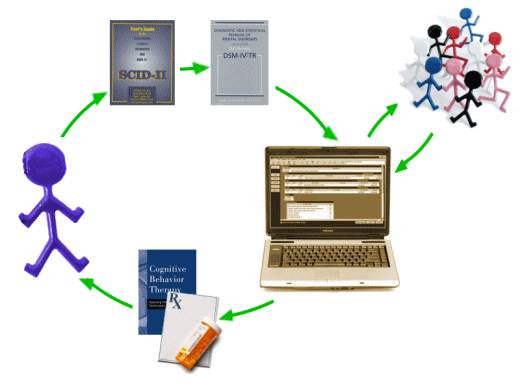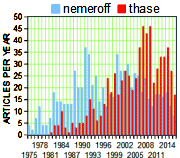you can’t learn it without books.
As an internist and later as a psychiatrist, I read about drugs, but I really learned about them from teachers, colleagues, and patients. When I came back to that part of psychiatry after retiring, I encountered something new – the people I now call KOLs. They were a class of experts, academics who published drug studies and wrote endlessly about them. I figured out that their recommendations came from the data from clinical trials, not from their experience. I knew enough of them personally to know that they didn’t see that many patients, certainly not to follow them long term. So it was a new class for me, not one I’d encountered in my wanderings through medicine and I was wary of their advice. Since I also found the text-books unhelpful and out-of-date the day they came out, I started reading the Clinical Trial reports myself – and that’s what got me here today.
One of the early papers I read was Barriers to implementation of a computerized decision support system for depression: an observational report on lessons learned in "real world" clinical settings. The author, a Madhukar Trivedi, had a computer program with an algorithm for using the antidepressants. He was trying to study his program, but what he found was that if he didn’t look over the clinicians’ shoulders, they didn’t use it.  So the paper was a sort of amateurish speculation about what psychic conflicts they might have that kept them from using his program [and scuttling his study]. Then I got to the end and read his Conflict of Interest declaration, and it was his psychodynamics I started thinking about! I wouldn’t have used his computer program either. Here’s what I had to say back then [evidence-based medicine I…]. Madhukar Trivedi, it turns out, is a KOL extraordinaire.
So the paper was a sort of amateurish speculation about what psychic conflicts they might have that kept them from using his program [and scuttling his study]. Then I got to the end and read his Conflict of Interest declaration, and it was his psychodynamics I started thinking about! I wouldn’t have used his computer program either. Here’s what I had to say back then [evidence-based medicine I…]. Madhukar Trivedi, it turns out, is a KOL extraordinaire.
by Martin B. Keller, James P. McCullough, Daniel N. Klein, Bruce Arnow, David L. Dunner, Alan J. Gelenberg, John C. Markowitz, Charles B. Nemeroff, James M. Russell, Michael E. Thase, Madhukar H. Trivedi, Janice A. Blalock, Frances E. Borian, Darlene N. Jody, Charles DeBattista, Lorrin M. Koran, Alan F. Schatzberg, Jan Fawcett, Robert M.A. Hirschfeld, Gabor Keitner, Ivan Miller, James H. Kocsis, Susan G. Kornstein, Rachel Manber, Philip T. Ninan, Barbara Rothbaum, A. John Rush, Dina Vivian, and John Zajecka.New England Journal of Medicine. 2000 342:1462-1470.
Background: Patients with chronic forms of major depression are difficult to treat, and the relative efficacy of medications and psychotherapy is uncertain.Methods: We randomly assigned 681 adults with a chronic nonpsychotic major depressive disorder to 12 weeks of outpatient treatment with nefazodone [maximal dose, 600 mg per day], the cognitive behavioral-analysis system of psychotherapy [16 to 20 sessions], or both. At base line, all patients had scores of at least 20 on the 24-item Hamilton Rating Scale for Depression (indicating clinically significant depression). Remission was defined as a score of 8 or less at weeks 10 and 12. For patients who did not have remission, a satisfactory response was defined as a reduction in the score by at least 50 percent from base line and a score of 15 or less. Raters were unaware of the patients’ treatment assignments.…
 Dr. Thase was on the faculty of the Western Psychiatric Institute in Pittsburgh from 1984 to 2007 when he moved to the Perlman School of Medicine in Philadelphia as Chief of the Division of Mood and Anxiety Disorders Treatment & Research Program. He writes broadly about the diagnosis and treatment of these disorders and so most of us think of him not in any specific role as an expert professional, but rather as a Professional Expert – a KOL who is everywhere. He still may not have caught up with Charlie Nemeroff in total publications, but he’s closing in fast [he got off to a late start].
Dr. Thase was on the faculty of the Western Psychiatric Institute in Pittsburgh from 1984 to 2007 when he moved to the Perlman School of Medicine in Philadelphia as Chief of the Division of Mood and Anxiety Disorders Treatment & Research Program. He writes broadly about the diagnosis and treatment of these disorders and so most of us think of him not in any specific role as an expert professional, but rather as a Professional Expert – a KOL who is everywhere. He still may not have caught up with Charlie Nemeroff in total publications, but he’s closing in fast [he got off to a late start].
Invited to a pharmaceutical industry conference on relationships with key opinion leaders was Dr. Michael Thase, a representative KOL. Thase, who was introduced as having authored over 500 publications and being “one of the brightest stars in neuroscience,” was a smiling and confident speaker, comfortable giving his narrative to this audience of mostly pharmaceutical company managersThase gave his disclosures in a practiced move. As he explained, In the past decade, I have been a consultant to the manufacturer of every compound that has been developed for the treatment of depression or the treatment of bipolar disorder, and some number of other compounds that haven’t made it through the multi phases stages of development.
Normally, he said, he presents this as two slides. He added a list of six pharmaceutical companies that had paid him to give talks in the previous 3 years, and another four that have recently funded research projects. He does not believe, he opined, that academics are very often dishonest, but he does recognize that “who you spend time with, where you make money, and so on,” can influence what you believe to be true. Dr. Thase is the quintessential KOL, a nationally recognized expert who is personable and a good public speaker. As one insider defines them, KOLs are well-known specialists who “can influence other physicians”…
A particular area of interest of mine is the increasingly acrimonious [and often sanctimonious] furor about the relationship between academic medicine and the pharmaceutical industry. Let me be up-front about my position: I am a libertarian by nature and firm believer in personal accountability, free markets, and limited regulatory interference. Unlike the editors of some of medicines more prestigious journals, however, I do not plan to write editorials broadly condemning a pseudomonolithic pharmaceutical industry while the publisher’s business office collects money for advertisements or academic supplements. Let me also be clear about this little economic fact: the Bulletin is a product of the publisher’s business, and it must at least break even to stay afloat. This means that it is essential to maintain honest, yet mutually beneficial relationships with the industry. Moreover, as "Big Pharma* is responsible for the development and introduction of virtually all new psychotropic medications, it seems an act of epic foolishness to try to impose some sort of hands-off relationship between our editorial board and the pharmaceutical industry…
1bom,
Do you have a link for that last Thase quote?
Do you have a clear understanding of what Thase means by
– firm believer in personal accountability
– honest relationships with the industry
As to: “Let me also be clear about this little economic fact: the Bulletin is a product of the publisher’s business, and it must at least break even to stay afloat. This means that it is essential to maintain honest, yet mutually beneficial relationships with the industry.”
http://www.vanityfair.com/news/2016/05/theranos-silicon-valley-media
Libertarian need not be synonymous with purveyor of crap to ones colleagues
http://hcrenewal.blogspot.com/2010/10/thats-education.html
Opening with “sanctimonious” tends to be a signal of condescension to come. Maybe someday rank and file clinicians will tire of this condescension. Or, at the very least, develop a desire to seek out those who would treat us with greater respect. Particularly those who would place primacy on the “honest” part of what’s essential to maintain, rather than on the “mutually beneficial” to the pharmaceutical company and them part.
Surely we as a community could take steps to nurture individuals with charisma AND that ethos?
Who have we got on the public stage who fits that bill in US Psychiatry? Maybe a few. I wonder who we have who fits that bill in US Child Psychiatry, On the public stage (like the Nemeroffs, Wagners, Koplewics, Thases,…etc). I do NOT think being chaste of all industry relationships should be a requirement to apply. Though honesty, and a lack of self-serving obtuseness and condescension, likely should be.
If we really are sheep, though I’m not necessarily convinced, can’t we at least come up with some better shepherds?
Hi 1bom,
A question to MODERATE OUT:
I posted a comment yesterday containing multiple links. If it is stuck in multiple link filter limbo, could you release it? If I don’t see it eventually appear I’ll assume it was a mistake on my end and I will try to repost. Thanks.